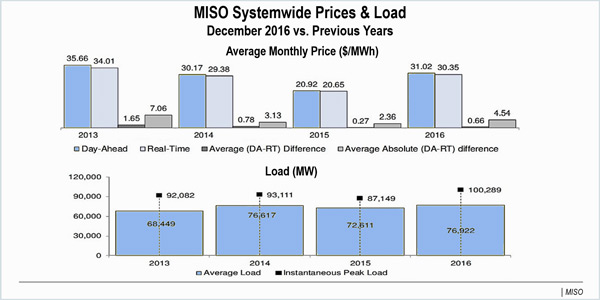CARMEL, Ind. — MISO Executive Director of Market Design Jeff Bladen called FERC’s recent storage order “very narrow in its focus” but that staff does not mind the sparse specifics.
The RTO is grateful that FERC didn’t order it to develop new market products or services, Bladen said. (See MISO Ordered to Change Storage Rules Following IPL Complaint.)
Another benefit: The order’s lack of detailed directives will allow MISO to continue its stakeholder-guided work on incorporating storage into its market.
“We certainly see this as aligned with our core guidelines,” Bladen said at a Feb. 9 Market Subcommittee meeting. He didn’t see the order requiring fundamental changes and didn’t think it would be difficult for the RTO to create a compliance filing (EL17-8).
In response to a question from Xcel Energy’s Kari Clark about whether MISO could implement new market rules within 60 days, Bladen said the window to submit a compliance filing is not a target for putting rules in place but a deadline to explain the RTO’s plan of action.
Bladen also doesn’t anticipate that the RTO’s compliance filing would be at odds with future directives stemming from FERC’s recent Notice of Proposed Rulemaking on storage (RM16-23, AD16-20).
Five-Minute Settlements BPM due in Summer
MISO is drafting Business Practices Manual language implementing five-minute settlements to share with stakeholders by early summer.
In its Jan. 11 compliance filing, required by FERC Order 825, the RTO requested a March 1, 2018, implementation date for aligning settlement calculations with dispatch and pricing intervals, seven weeks after the order’s projected date (ER17-778). John Weissenborn, MISO’s director of market services, said the additional time is needed for “extensive software development and testing.”
“We are working on developing some key milestones and project planning,” added Weissenborn.
Under the revisions, MISO will settle excessive and non-excessive energy market trades, price volatility make-whole payments and real-time revenue sufficiency guarantee (RSG) make-whole payments on a five-minute basis. Weissenborn said some real-time settlements, like asset energy and net inadvertent distribution, will remain hourly. MISO also said it has been compliant with an Order 825 requirement for 15-minute interval interchange transaction settlements since mid-2015.
Weissenborn said the Tariff filing changes several mentions of “hourly” to “dispatch interval.”
“We believe we are in compliance. If we’ve missed something, we’ll file again,” he added.
Bladen said MISO is “moving ahead with the implementation. … We’ll be ready in March, barring something completely unforeseen.”
Natural Gas Price Hike Raises December Energy Prices, RSG Payments
Higher gas prices drove systemwide average energy prices above $30/MWh across MISO in December, a 22.4% upsurge from November.
The $3.59/MMBtu average price in December was up 45% from November and 91% from December 2015.
MISO said the impact of high fuel prices on real-time energy price was mitigated “to some extent” by higher wind output and more resources back online after planned outages in the fall. However, the high gas prices led to “disproportionate increases” in RSG payments during the month, the RTO said.
Total real-time RSG make-whole payments totaled $7.1 million in December, a three-fold increase from November. Day-ahead RSG payments hit $6.5 million. MISO said most of its day-ahead payments were made to voltage and local reliability resources in MISO South, where emergency conditions in load pockets were declared on multiple days in early December.
During a Feb. 3 Markets Committee of the Board of Directors meeting, Independent Market Monitor David Patton said the high RSG payments were not unusual.
“When we see higher real-time prices rise, we see uplift and revenue sufficiency guarantee rise even faster,” Patton said.
December saw a 99.9-GW load peak, higher than December 2015’s 87.1-GW peak, Vice President of System Operations Todd Ramey said. Load averaged 76.9 GW for the month.
Total wind energy production in December was 5,687 GWh, the highest value ever recorded for MISO. Wind represented about 11% of the RTO’s total energy output for the month.
— Amanda Durish Cook





